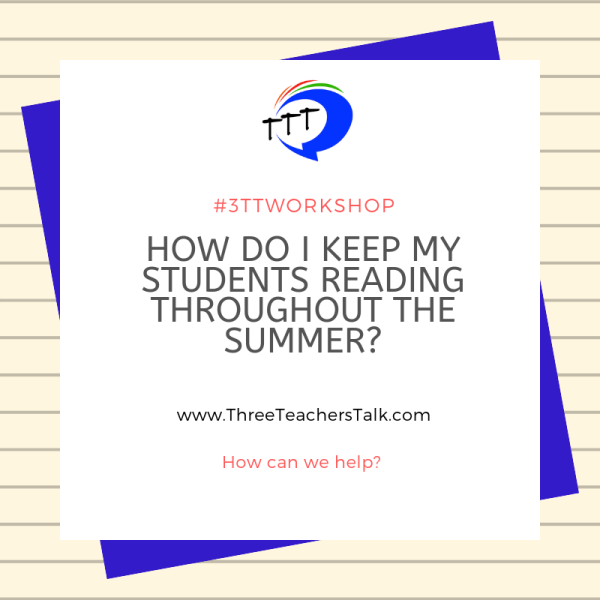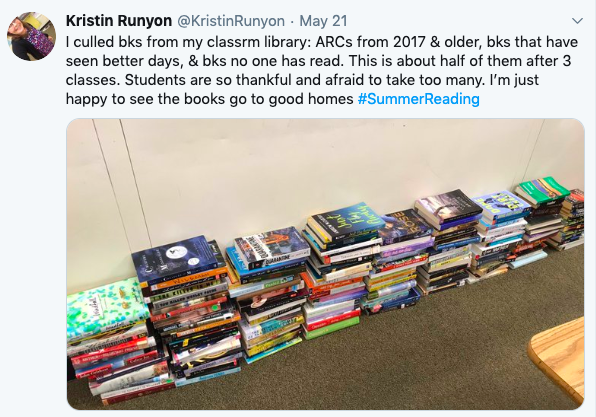
Let us know if you have questions about readers-writers workshop. Throughout the summer, we’ll be posting answers.
Don’t you just love this question so much more than “What do you do for summer reading?”
Of course, we know to get to the “keep my students reading” part, we have to do a lot of work — sometimes a whole lot of work — to get some student reading throughout the school year. And those of us who give so much of our time to this heart work of reading, can feel sad, anxious, and exasperated when our students leave us and get “assigned” a book, or more than one, for summer reading.
For several years, my AP Lang students, many who were second language learners who took a courageous leap to tackle an advanced English class, would read stacks of self-selected books, and grow exponentially as readers, only to get handed at the end of their junior year a summer reading assignment and a list of study questions for AP Lit. Beowulf. This is problematic on so many different levels — but entirely out of my control. What could I do?
The only thing that made sense at the time was to encourage my students to form their own summer book clubs. I suggested they might set some goals to read their assigned text first, and then meet together to talk about it — similar to what they’d done in class in the three rounds of books clubs we’d done throughout the year. Then, they could choose another book and meet up again. Students took it upon themselves to circulate an interest form, and most students wrote that they were interested.
It didn’t really work. I was too busy in the summers to commit to keeping the idea alive. And we all know soon-to-be-seniors, or many teens for that matter: Procrastination is their BFF.
I still love the idea of summer book clubs, and I know some schools are having great success with them. Hebron High School is one of them. The English department at Hebron is doing amazing things to cultivate a culture of reading, not just during the school year, but throughout the summer as well. They open the school library every Wednesday afternoon, so students can select books — and get coaching for college essays. They’ve got book clubs scheduled with teachers and coaches. They’ve got a wish list for books circulating within their community. Really fantastic ideas to keep the focus on the power of reading.
Scholastic recently released a report about summer reading trends. The report states that 32% of young people ages 15-17 read zero books over the summer — up 10% in two years. The report also states that “53 percent of kids get most of the books they read for fun through schools—so what happens for that majority when school isn’t in session?”
It doesn’t take much to know the answer. So what can we do? Besides following Hebron’s lead, here’s a few ideas:
- Talk up your public library! Invite a librarian to come visit your classes, and get students to sign up for library cards. One of my biggest regrets at my last school is that I didn’t take my 11th and 12th grade students on a field trip to the public library. We could have walked — the library was that close. I know the majority of my students had never been inside, and every year I thought what a great activity this would be. Every year I didn’t do it. #ifIcouldgoback
- Cull your classroom library, and let students take home books. I know. I know. Many of us invest so much time, energy, and money building fantastic classroom libraries, and we lose enough books throughout the year without giving them out freely at the end of it. But, really, what can it hurt? Every year I’d pull books that I felt I could give up and put them on the whiteboard rails for students to take home for the summer. (Sometimes they even brought them back.) It didn’t matter. I’d rather have books in kids’ hands than hidden under butcher paper in my closed up classroom. Kristin does, too:

- Give students access to lists of high interest and award winning books — and free resources. Pernille Ripp shares her students’ favorite books each year. YALSA has great lists. And a cool new Teen Book Finder. BookRiot published “11 Websites to Find Free Audiobooks Online.” Audiobook Sync gifts two free audiobooks all summer. Great titles, too!
- Invite students to talk to you about their reading. Yes, even during the summer! Lisa does this in a slowchat on Twitter with students who will be in her classes in the fall. Students tweet her updates about their reading lives. She tweets back. It’s a great way to build relationships and share book ideas.
Every year I feel like I could have done more to keep my students reading throughout the summer. The truth is — we can only do what we can do. Sometimes it touches the right student at the right time. Sometimes we just keep trying.
I’m sure you have more ideas. Please share them in the comments.
Amy Rasmussen lives, gardens, and rides her bike in North Texas. She will be spending a lot of her summer with teachers facilitating PD around readers-writers workshop in secondary English classes. Her favorite thing. She’s also going to be doing a lot of writing. And a little poetry study at the Poetry Foundation Summer Teachers Institute in Chicago. Follow her @amyrass
Tagged: summer reading

I do give assigned reading for my rising 9th graders, but I have them choose books off the Florida Teens Read list. From the website, “The reading list is comprised of fifteen titles that have been chosen by a committee of twelve school librarians specifically to engage high school students (grades 9 through 12) in reading and reflect their interests as well as represent a variety of genres, formats, reading levels, viewpoints, and ethnic and cultural perspectives.” Every year I get students coming in after summer saying “I read the books and actually liked them.” So that’s exciting!!
LikeLike
[…] we need a plan. We know that if we don’t plan for a positive summer reading experience, that’s the same as planning for many of our students to not read at all… […]
LikeLike
[…] we need a plan. We know that if we don’t plan for a positive summer reading experience, that’s the same as planning for many of our students to not read at all… […]
LikeLike
Having book access is critically important, but maybe time and space are important too. I don’t have this fully thought through, but what if students knew that certain times (10 am, 6 pm on Mondays and Thursday, for example) and places (a local park, library, coffee shop) would be for meet-ups to read together and talk about reading. The ones who need it most probably would not attend, but this might serve as a kind of magnetic center for some hardcore readers and fringe readers. Teachers could be present or not.
LikeLike
I love learning from the voices here! Thank you for the great links and insight! I’m always inspired, too, by the nudging and questions these posts pose at the end.I work at an independent school, so I only have about 70 students. (Little aside: isn’t it crazy to think that 70–a pretty big swath of kiddos–is considered a small load, that it is less than half of what public school teachers have?!). This year, I’m looping with my seventh graders for eighth grade so they’ll be going home with a stack of books. Last year, I met with each incoming eighth grader before summer and they left with a book. I know summer assignments can kill reading, but I gave them my home address and asked if they would write me a letter at some point over the summer to let me know how the reading was going for them (and demanded no summaries!). I loved receiving the trickle of letters and postcards throughout the summer from kids. It gave me a taste of who they are. They came into the school year already having given me a taste of their voice and their reading. I’m going to do the same this year. This year with seventh and eighth graders, I’m going to try a book-a-week challenge/invitation where, on the platform of an online community via Kidblog, we share our book-a-week love.
LikeLiked by 1 person
Oh, I love this: “…I gave them my home address and asked if they would write me a letter at some point over the summer to let me know how the reading was going for them (and demanded no summaries!)” You show so much trust, and it looks like your students responded well. Thanks for sharing such a great idea!
LikeLike
This is brilliant–so many classroom library books go unread each year because they’re lost in the masses. To pull them out and send home with kids over the summer is so smart. It’s the Marie Kondo of librarying!! 🙂
LikeLiked by 1 person